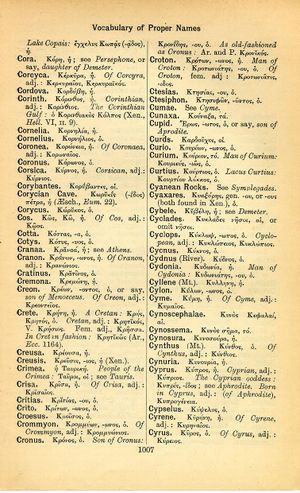Cyrene
λέγεται δὲ καὶ κλῶνας αὐτῆς θύραις ἢ θυρίσι προστεθέντας ἀποκρούειν τὰς τῶν φαρμάκων κακουργίας → its branches attached to doors or windows are said to repel the evil of spells
English > Greek (Woodhouse)
Κυρήνη, ἡ.
Of Cyrene, adj.: Κυρηναῖος.
Latin > English (Lewis & Short)
Cȳrēnē: ēs, and Cȳrēnae, ārum, f.,
I the chief town of a province of the same name in Libya, now Kuren, celebrated for its trade, and as the birthplace of Callimachus, Eratosthenes, and Aristippus, Mel. 1, 8, 2; Plin. 5, 5, 5, § 31; Sall. J. 19, 3; Plaut. Rud. prol. 41; Cic. Planc. 5, 13; Nep. Ages. 8, 6; Sil. 8, 57; Cat. 7, 4; Sol. 27, 44.—
II Hence,
A Cȳrēnăĭcus, a, um, adj., Cyrenaic: provincia, or absol.: Cȳrē-năĭca, ae, f., the province Cyrenaica, in Libya, Mel. 1, 8, 1; Plin. 5, 5, 5, § 31 sq.; also Cyrenaica Africa, id. ib. § 8: lacrima, i. e. laser, Scrib. Comp. 167; cf. Plin. 19, 3, 15, § 38 sq.: philosophia, the school of philosophy founded by Aristippus, Cic. de Or. 3, 17, 62.—Subst.: Cȳrēnăĭci, ōrum, m., its adherents, Cic. Ac. 2, 42, 131; id. Tusc. 3, 13, 28; id. Off. 3, 33, 116 al.—
B Cȳrē-naeus, a, um, adj., of Cyrene: urbs, i. e. Cyrene, Sil. 8, 159: aquae, i. e. drunk by Callimachus, Prop. 4 (5), 6, 4.—
2 Subst.: Cȳ-rēnaei, ōrum, m.
a The inhabitants of Cyrene, Nep. Hann. 8, 1.—
b The adherents of the Cyrenaic philosophy (cf. the preced.), Cic. Ac. 2, 24, 76.—
C Cȳrēnensis, e, adj., the same: senatus, Plaut. Rud. 3, 4, 8: populares, id. ib. 3, 2, 1: agri, Cic. Agr. 2, 19, 51: provincia, Dig. 19, 2, 61.—In plur. subst.: Cȳrēnenses, ĭum, m., inhabitants of Cyrene, Sall. J. 79, 2; Plin. 7, 56, 67, § 208; Tac. A. 3, 70.
Cȳrēnē: ēs, f., = Κυρήνη.
I A nymph, mother of Aristæus, Verg. G. 4, 376; 4, 354; Just. 13, 7.—
II A nymph, mother of Idmon, Hyg. Fab. 14.—
III A fountain in Thessaly, Serv. ad Verg. G. 4, 354.

